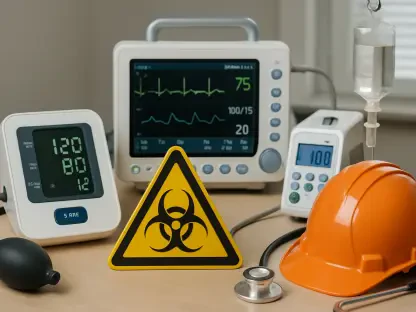In an era where timely access to medical supplies can make all the difference in a patient’s life, Cardinal Health at-Home Solutions has taken a monumental step to enhance its direct-to-patient delivery network with a significant expansion in Texas. This strategic initiative centers on the opening of a state-of-the-art facility in Fort Worth, designed to meet the escalating demand for critical healthcare items such as catheters, continuous glucose monitors, and nutritional feeding supplies. With millions of Americans relying on these life-sustaining products, the company’s focus is on revolutionizing logistics to ensure speed, accuracy, and reliability. The stakes couldn’t be higher in a sector where a delayed or incorrect delivery can have serious consequences. This move not only strengthens Cardinal Health’s foothold in the home healthcare industry but also sets a new standard for how essential supplies reach those in need, particularly in a rapidly growing region like Texas, where demand continues to surge.
Revolutionizing Logistics with Cutting-Edge Automation
The cornerstone of Cardinal Health’s Texas expansion is a sprawling 340,000 square-foot facility in Fort Worth, engineered to be among the fastest order fulfillment systems worldwide. Equipped with advanced automation and robotics, this hub can ship over 80,000 packages daily with near-perfect precision, ensuring patients across the nation receive their critical supplies within 24 hours. Technologies such as high-speed cubic storage grids and automated right-size box machines streamline the process, minimizing delays and maximizing efficiency. This level of innovation reflects a deep commitment to meeting the urgent needs of individuals who depend on these products for their daily well-being. By integrating such sophisticated systems, the company addresses the inherent challenges of handling high volumes while maintaining the highest standards of service delivery.
Beyond the impressive technology, this new facility tackles longstanding inefficiencies that plagued the previous setup in Fort Worth, which operated out of a smaller 150,000 square-foot space alongside annexed areas. The fragmented nature of those operations often led to logistical bottlenecks, slowing down fulfillment times and increasing costs. Consolidating into a single, modern hub allows Cardinal Health to optimize workflows and enhance employee safety with ergonomic designs and automated processes. This shift not only boosts productivity but also underscores a zero-tolerance policy for errors, recognizing that even a minor mistake can have significant repercussions for patients. The investment in automation represents a forward-thinking approach, ensuring the company remains agile in a competitive and ever-evolving healthcare landscape.
Addressing Surging Demand in the Lone Star State
Texas has emerged as a hotspot for home healthcare needs, with a growing population requiring direct-to-patient medical supplies at an unprecedented rate. Cardinal Health’s response to this trend is a calculated expansion that prioritizes scalability and cost-effectiveness through the new Fort Worth facility. The previous regional operations struggled with capacity constraints and inefficiencies due to their dispersed setup across multiple smaller sites. By transitioning to a dedicated, larger space, the company can now handle increased order volumes with greater ease, ensuring that patients in Texas and beyond receive their supplies without interruption. This strategic move aligns with broader industry shifts toward personalized delivery models that improve patient outcomes by reducing wait times.
Moreover, this expansion positions Cardinal Health to anticipate future growth in the region, where demographic changes and an aging population are expected to drive even higher demand over the coming years, from 2025 onward. The Fort Worth hub is not merely a reaction to current needs but a proactive step to build a robust infrastructure capable of adapting to evolving market dynamics. This foresight is critical in an industry where staying ahead of the curve can mean the difference between meeting patient expectations and falling short. The focus on a centralized, high-capacity facility also allows for better resource allocation, reducing operational costs while maintaining service quality. As home healthcare continues to play a vital role in modern medical care, such investments highlight the importance of regional strategies tailored to specific geographic and demographic challenges.
Prioritizing Workforce Development and Community Ties
A pivotal aspect of Cardinal Health’s expansion in Texas is the emphasis on supporting and empowering its workforce during this transformative period. Recognizing that a motivated and skilled team is essential for operational success, the company carefully selected a location for the new Fort Worth facility near existing sites to minimize disruption for employees. Extensive training programs have been implemented to familiarize staff with the advanced automation technologies integrated into the hub, ensuring they are well-prepared to navigate the modernized environment. This investment in human capital reflects a broader understanding that technological advancements are only as effective as the people operating them, particularly in a field where precision is paramount.
Equally important is the commitment to fostering a sense of community and pride among employees, evident through initiatives like the Family Day celebration held at the new facility. This event offered staff and their loved ones a chance to tour the cutting-edge space, witness automation in action, and participate in community contributions such as food donations to local charities. Under the leadership of Lane Long, director of operations for the Fort Worth region, there has been a clear focus on career development, safety protocols, and employee satisfaction. These efforts have cultivated a workplace culture that values individual contributions while aligning them with the company’s mission to serve patients. By blending professional growth with personal engagement, Cardinal Health ensures that its team remains dedicated and resilient, even amidst the challenges of a major operational transition.
Navigating Complex Logistics for Seamless Transition
The move to the new Fort Worth facility was no small feat, requiring intricate planning to transfer $40 million worth of inventory without compromising service levels. Overseen by dedicated supply chain and inventory management teams, this process involved meticulous advance preparation and phased transitions to maintain stock availability for customers. The challenge was to relocate operations from two separate sites into one cohesive hub while ensuring that patient orders continued to be fulfilled with the same speed and accuracy. This logistical endeavor demanded close collaboration across departments, including real estate, IT, operations, and security, highlighting the company’s ability to manage high-stakes projects with precision and adaptability in a high-pressure environment.
Reflecting on the complexity of this transition, it becomes clear that the success of such a large-scale move hinged on strategic timing and flexibility in handling customer order flows. Every detail, from inventory tracking to system integration, was carefully orchestrated to avoid disruptions that could impact patients relying on timely deliveries. The seamless execution of this relocation stands as a testament to Cardinal Health’s operational expertise and commitment to maintaining trust with those who depend on their services. Lessons learned from similar expansions in other states provided valuable insights, enabling the Texas team to refine their approach and achieve a smooth rollout. This achievement not only strengthened the company’s regional capabilities but also set a benchmark for future projects in the home healthcare logistics space.
Reflecting on a Milestone in Healthcare Delivery
Looking back, Cardinal Health at-Home Solutions achieved a remarkable milestone with the establishment of the Fort Worth facility, marking a significant chapter in the evolution of home healthcare logistics. The integration of advanced automation, the consolidation of fragmented operations, and the unwavering focus on employee well-being came together to create a hub that redefined efficiency and reliability in patient care. This project stood as a powerful example of how strategic investments could address immediate needs while laying the groundwork for sustained growth. Moving forward, the industry can look to this expansion as a model for balancing technological innovation with human-centric values. Stakeholders are encouraged to monitor how such facilities adapt to future demands, potentially exploring partnerships or further technological upgrades to enhance service delivery. This achievement in Texas serves as an inspiration for other regions to prioritize scalable, patient-focused solutions in the ever-critical realm of healthcare access.









